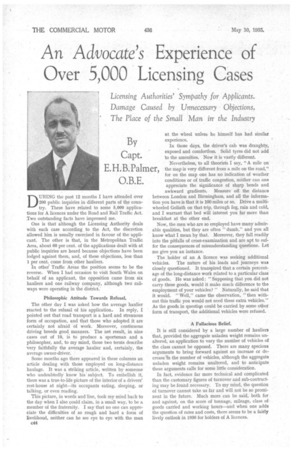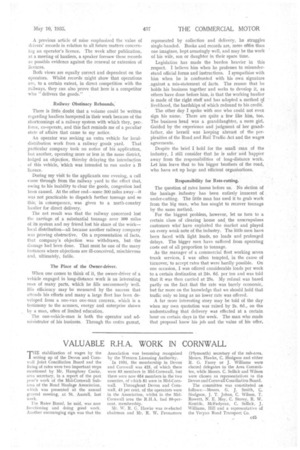By Capt.
Page 102

Page 103

If you've noticed an error in this article please click here to report it so we can fix it.
E.H.B.Palmer, O.B.E.
DURING the past 12 months I have attended over 200 public inquiries in different parts of the country. These have related to some 6,000 applications for A licences under the Road and Rail Traffic Act. Two outstanding facts have impressed me.
One is that although the Licensing Authority deals with each case according to the Act, the discretion allowed him is usually exercised in favour of the applicant. The other is that, in the Metropolitan Traffic Area, about 60 per cent, of the applications dealt with at public inquiries are heard because objections have been lodged against them, and, of these objections, less than 1 per cent. come from other hauliers.
In others Traffic Areas the position seems to be the reverse. When I had occasion to visit South Wales on behalf of an applicant, the opposition came from six hauliers and one railway company, although two railways were operating in the district.
Philosophic Attitude Towards Refusal,
The other day I was asked how the average haulier reacted to the refusal of his applicationIn reply, I pointed out that road transport is a hard and strenuous form of occupation, and that those who adopted it are certainly not afraid of work. Moreover, continuous driving breeds good. manners. The net result, in nine cases out of 10, is to produce a sportsman and a philosopher, and, to my mind, those two terms describe very faithfully the average haulier and, certainly, the average owner-driver.
Some months ago there appeared in these columns an article dealing with those employed on long-distance haulage. It was a striking article, written by someone who undoubtedly knew his subject. To embellish it, there was a true-to-life picture of the interior of a drivers' rest-house at night—its occupants eating, sleeping, or talking, or even reading. .
This picture, in words and line, took my mind back to the day when I also could claim, in a small way, to be a, member of the fraternity. I say that no one cart appreciate the difficulties of so rough and hard a form of livelihockd, neither can he see eye to eye with the man c44 at the wheel unless he himself has had similar experience.
In those days, the driver's cab was draughty, exposed and comfortless. Solid tyres did not add to the amenities. Now it is vastly different.
Nevertheless, to all theorists I say, 'A mile on the map is very different from a mile on the road," for on the map one has no indication of weather conditions or of traffic congestion, neither can one appreciate the significance of sharp bends and awkward gradients. Measure off the distance between London and Birmingham, and all the information you have is that it is 100 miles or so. Drive a multiwheeled Goliath on that trip, through fog, rain and cold, and I warrant that bed will interest you far more than breakfast at the other end.
Now, the men who are so employed have many admirable qualities, but they are often "dumb," and you all know what I mean by that. Moreover, they fall readily into the pitfalls of cross-examination and are apt to suffer the consequences of misunderstanding questions. Let me give you an instance.
The holder of an A licence was seeking additional • vehicles. The nature of his loads and journeys was closely questioned. It transpired that a certain percentage of the long-distance work related to a particular class of goods. He was asked : "Supposing that you did not carry these goods, would it make much difference to the employment of your vehicles? " Naturally, he said that it would. "Well," came the observation, "then without this traffic you would not need these extra vehicles." As the goods in question could be carried by some other form of transport, the additional vehicles were refused.
A Fallacious Belief.
It is still considered by a large number of hauliers that, provided the aggregate unladen weight remains unaltered, an application to vary the number of vehicles of the class cannot be opposed. There are many specious arguments to bring forward against an increase or decrease in the number of vehicles, although the aggregate unladen weight remains unaltered, and to anticipate these arguments calls for some little consideration.
In fact, evidence far more technical and complicated than the customary figures of turnover and sub-contracting may be found necessary. To my mind, the question of turnover cannot take us far and will not be so prominent in the future. Much more can be said, both for and against, on the score of tonnage, mileage, class of goods carried and working hours—and when one adds the question of rates and costs, there seems to be a fairly lively outlook in 1936 for holders of A licences. A previous article of mine emphasized the value of drivers' records in relation to all future matters concerning an operator's licence. The week after publication. at a meeting of hauliers, a speaker foresaw these records as possible evidence against the renewal or extension of licences.
Both views are equally correct and dependent on the operators. Whilst records might show that operations are, to a certain extent, in direct competition with the railways, they can also prove that here is a competitor who " delivers the goods."
Railway Obstinacy Rebounds: There is little doubt that a volume could be written regarding hauliers hampered in their work because of the shortcomings of a railway system with which they, perforce, co-operate, and this fact reminds me of a peculiar state of affairs that came to my notice.
An operator was seeking an extra vehicle for local
distribution work from a railway goods yard. That particular company took no notice of his application, but another, operating more or less in the same district, lodged an objection, thereby delaying the introduction of this vehicle, -which was intended to run under a B licence.
During my visit to the applicants one evening, a call came through from the railway yard to the effect that, owing to his inability to clear the goods, congestion had been caused, At the other end—some 300 miles away—it was not practicable to dispatch further tonnage and so this; in consequence, was given to a north-country haulier for direct delivery.
The net result was that the railway concerned lost the carriage of a substantial tonnage over 300 miles of its system and my friend lost his share of the wOrklocal distribution—all because another railway company was proving obstructive. On a representation of facts, that company's objection was withdrawn, but . the damage had been done. That must be one of the many instances where objections are ill-conceived, mischievous and, ultimately, futile.
The Place of the Owner-driver.
When one comes to think of it the owner-driver of a vehicle engaged in long-distance work is an interesting man of many parts, which he fills uncommonly well. His efficiency may be measured by the success that attends his efforts and many a large fleet has been developed from a one-van one-man concern, which is a testimony to the acumen, energy and enterprise shown by a man, often of limited education.
The one-vehicle-man is both the operator and administrator of his business. Through the entire gamut,
represented by collection and delivery, he struggles single-handed. Books and records are, more Wen than one imagines, kept amazingly well, and may be the work of his wife, son or daughter in their spare time.
Legislation has made the burden heavier in this respect. I believe him when he professes to misunderstand official forms and instructions. I sympathize with him when he is confronted with his own signature .against a mis-statement of facts. The reason that he holds his business together and seeks to develop it, as others have done before him, is that the working haulier is made of the right stuff and has adopted a method qf livelihood, the hardships of which redound to his credit.
The other day I spoke with one who could not even sign his name. There are quite a few like him, too. The business head was a granddaughter, a mere girl. Guided by the experience and judgment of her grandfather, she herself was keeping abreast of the perplexities of the Road and Rail Traffic Act and the wages agreements.
Despite the brief I hold for the small man of the industry, I still consider that he is safer and happier away from the responsibilities of long-distance work. Let him leave that to •his bigger brothers of the road,. who have set up large and efficient organizations.
Responsibility for Rate-cutting.
The question of rates looms before us. No section of the haulage industry has been entirely innocent of under-cutting. The little man has used it to grab work from the big man, who has sought to recover tonnage by the same method.
For the biggest problem, however, let as turn to a certain class of clearing house and, the unscrupulous customers who have exploited the market and played on every weak note of the industry. The little men have been faced with light loads, no loads and prolonged delays. The bigger men have suffered from operating costs out of all proportion to tonnage.
As the manager of a commercial fleet working seven trunk services, I •was often tempted, in the cause of turnover; to accept rates that were hardly possible. On one occasion, I was offered considerable loads per week to a certain destination at 24s. 6d. per ton and was told that it was then carried at 25s. My refusal was based partly on the fact that the rate was barely economic, but far more on the knowledge that we should hold that traffic only so long as no lower rate was offered.
A far more interesting story may be told of the day when my own quotation was raised by 2s. 6c1., on the understanding that delivery was effected at a certain hour on certain days in the week. The man who made that proposal knew his job and the value of his offer.




































































































































































